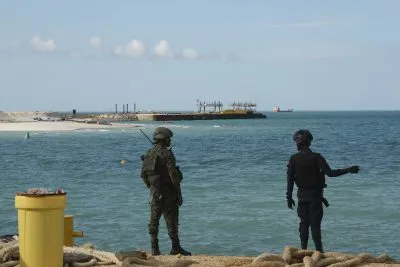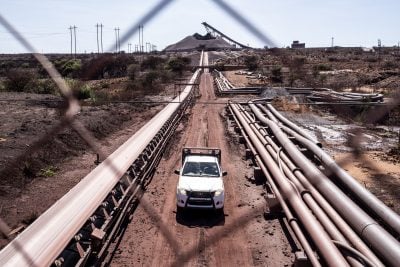On the evening of 26 July 1956, President Gamal Abdel Nasser of Egypt nationalised the Suez Canal, until then owned by mainly British and French shareholders. “Tonight, I am wresting control of the company on behalf of the Egyptian people… We will reclaim the profits that this imperialist company – this state-within-a-state – made while we were starving to death,” he proclaimed in a speech in Alexandria.
The announcement drove the crowd wild with delight. Nasser promised that the $100m annual revenues derived from charging international shipping to pass through this strategic Egyptian waterway would now be used to construct a dam at Aswan, a crucial step in the industrialisation of the country.
Since then, the canal has not only played an important role in the economic development of modern Egypt but has also been symbolic of the country’s self-determination. However, almost seven decades on from Nasser’s famous proclamation, could Egypt’s increasingly serious economic crisis threaten Cairo’s control over this vital piece of infrastructure?
Growing economic difficulties
Egypt’s economic difficulties are deeply rooted but have escalated since the onset of the coronavirus pandemic in 2020. Abdel Fattah al-Sisi, who became Egypt’s president in June 2014 after the ouster of Islamist President Mohammed Morsi the previous year, is a former army general and has allowed Egypt’s national economy to become dominated by the military.
The Egyptian armed forces are often tasked with infrastructure projects and civilian economic activities that would normally be the domain of the private sector. President Sisi and previous administrations have also demonstrated a fondness for multi-billion dollar “white elephant” vanity projects which achieve little apart from indebting Cairo even further.
These long-standing problems came to a head, however, during the pandemic. Revenues from tourism plummeted during the two years of the pandemic amid a halt in international travel. As tourism is a significant source of foreign exchange inflows into Egypt, this also contributed to a serious shortage of US dollars.
Partly because of this shortage – alongside higher interest rates globally, a stronger US dollar, and weaker Egyptian pound – Cairo found it more difficult to service its sovereign debt. Officially, Egypt’s national debt stood at $169.5bn at the end of December 2022, although there are suspicions that the true number is significantly higher.
This year the Egyptian pound has fallen to record lows against the dollar. Given the country is also running a trade deficit, this has pushed up the prices for essential goods, with inflation now running at over 30%. Put simply, Cairo is facing a fundamental economic crisis from multiple angles.
Attractions of privatisation
It is in this context that rumours have emerged that the Egyptian government might be tempted to privatise the Suez Canal and sell off the lease to a foreign bidder. The Economist recently valued a 99-year lease for the canal at around $1 trillion – a huge lump of cash that could prove tempting for a government struggling to find its way out of an economic morass.
Pierre Boussel, research associate at the Foundation for Strategic Research in Paris, says that “the economic and political stakes involved in the privatisation of the Suez Canal are such that President Sisi will not make a hasty decision. He is fully aware of the symbolic and therefore sensitive dimension of the issue.”
While Boussel believes that “full privatisation is highly unlikely”, he thinks that “some port activities could be handed over to private players, such as logistics, desilting, and maintenance companies.”
Even a partial privatisation of the Suez Canal would be significant, however, in geopolitical as well as economic terms. The Suez Canal is of crucial strategic importance: it is the only route that connects European waters with the Arabian Sea, accounts for 12% of global trade and around 10% of the world’s daily seaborne oil trade. Over 20,000 vessels pass through the canal every year, with the route playing a key role in connecting African, Asian, and European commodity markets.
Boussel thinks that the strategic advantages offered by owning the canal could make it an attractive investment for China, should that opportunity arise. He tells African Business that “the Chinese will undoubtedly be in the greatest hurry and the least concerned about the size of the bill, as Beijing wants to secure its Silk Road and get its hands on the world’s main bottlenecks, such as canals and straits.”
Other potential buyers include Egypt’s oil-rich allies in the Gulf. Boussel suggests that, should the Suez Canal be privatised, the sale would likely include a range of different countries. “For Egypt, a consortium of buyers would be more reassuring because it would be less monolithic,” he says, meaning that Cairo would be better placed to exert political leadership over the canal.
Nonetheless, privatisation of the Suez Canal would undoubtedly raise eyebrows – and be fraught with geopolitical risk. “If Beijing got its hands on the Suez Canal, what would happen to its traffic in the event of a conflict with Taiwan? What if the Russians got a blocking minority in the stock portfolio? Wouldn’t President Putin be tempted to use the Suez Canal to counter Western sanctions? All these unanswered questions are not very reassuring for global maritime trade,” Boussel says.
Are there better options?
That said, it is worth noting that a hypothetical sale of the Suez Canal remains just that – hypothetical – despite the difficult economic predicament Cairo finds itself in. Mathias Althoff, vice chief investment officer at Tundra Fonder, a fund manager specialising in emerging markets, says that the move “sounds very speculative and, even considering the stress Egypt is under, I view it as extremely unlikely.”
Althoff tells African Business that the Suez Canal provides a crucial source of US dollars to Egypt and that giving this up would only exacerbate its foreign exchange crisis.
“Last year USD revenue from the Suez Canal was $8bn. Giving that up would be very, very expensive.
“I would say there are better options out there. They have plenty of other assets to sell or lease that they should prioritise to decrease the involvement of the government and military in the economy. Key infrastructure should not be on the table at this stage.”
Government denies plans
The Egyptian government has denied it has any plans to sell off the Suez Canal. In February, President Sisi called the rumours “a lie”. However, in December last year, the Egyptian parliament approved a change to the law that allows the Suez Canal Authority (SCA) to establish a fund through which it can sell or lease some of its assets.
This raised fears in Egypt that the government and SCA were open to selling stakes in the canal to foreign governments or entities. The Egyptian cabinet denied that the fund was a “back door to selling the canal”, with the chairman of the SCA, Osama Rabie, also saying that the Suez Canal is “not for sale”.
While any sell-off of the Suez Canal – partial or complete – remains a long way off for now, it does appear that the Egyptian government is more open to foreign involvement in the canal than has previously been the case. It is possible that Cairo sees the canal’s assets, at least in theory, as part of the answer to the country’s shortage of hard currency and other economic problems.
But whether it would be politically possible for an Egyptian government to survive an attempt to privatise the Suez Canal – given its strategic and symbolic importance – is another question.
Want to continue reading? Subscribe today.
You've read all your free articles for this month! Subscribe now to enjoy full access to our content.
Digital Monthly
£8.00 / month
Receive full unlimited access to our articles, opinions, podcasts and more.
Digital Yearly
£70.00 / year
Our best value offer - save £26 and gain access to all of our digital content for an entire year!

 Sign in with Google
Sign in with Google 



